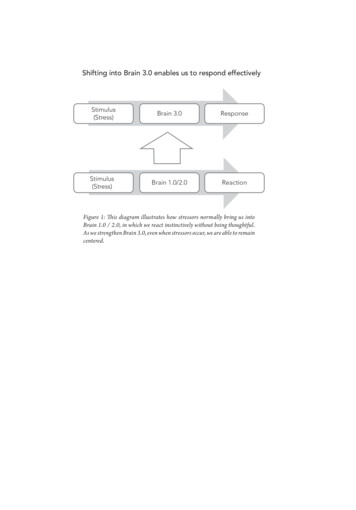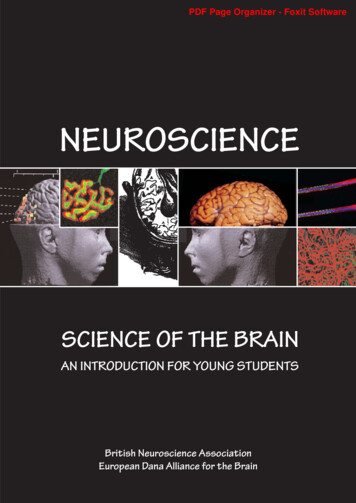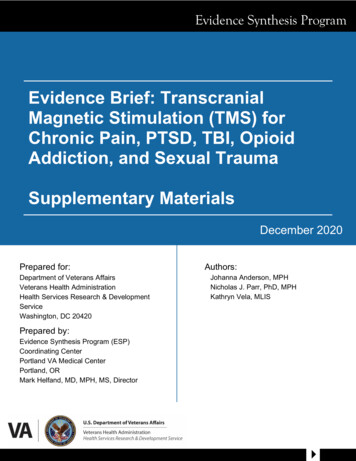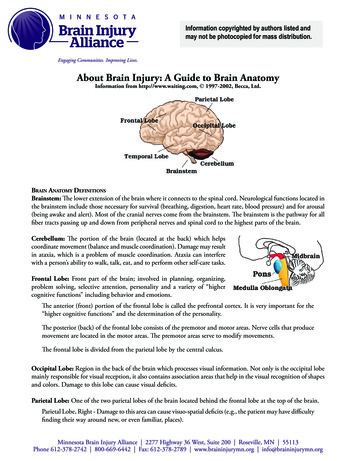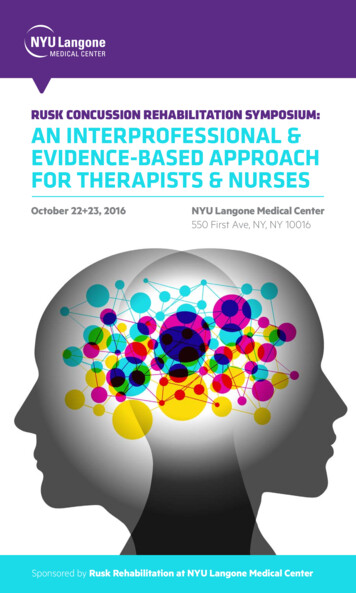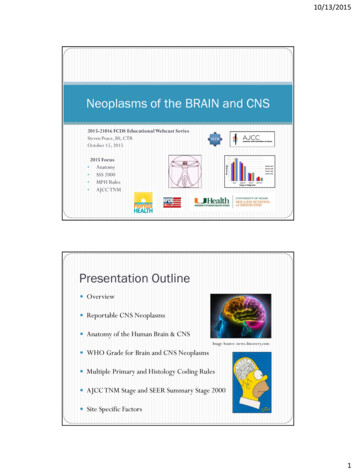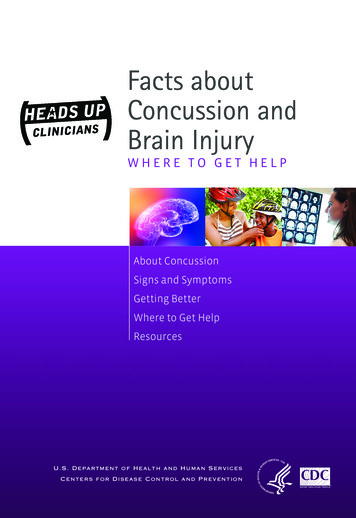
Transcription
Facts aboutConcussion andBrain InjuryWHERE TO GET HELPAbout ConcussionSigns and SymptomsGetting BetterWhere to Get HelpResourcesU.S. Department of Health and Human Service sCenters for Disease Control and Prevent ion
Facts aboutConcussion andBrain InjuryABOUTCONCUSSIONSWHERE TO GET HELPABOUT CONCUSSION2Medical Help3Danger Signs—Adults4Danger Signs—Children4SYMPTOMS OF CONCUSSION5Persons of All Ages5Young Children6Older Adults7GETTING BETTER8Tips for Healing—Adults10Tips for Healing—Children11WHERE TO GET HELP13Help for People with Concussion 13Help for Families and Caregivers 14Resources15“Facts about Concussion and Brain Injury:Where to Get Help,” is a publication of theCenters for Disease Control and Prevention,National Center for Injury Prevention andControl. See www.cdc.gov/TraumaticBrainInjury.
A concussion is a mild form of traumatic braininjury (TBI) caused by a bump, blow, or jolt to thehead. Concussions can also occur from a fall or ablow to the body that causes the head to moverapidly back and forth. Doctors may describe theseinjuries as “mild” because concussions are usuallynot life-threatening. Even so, their effects can beserious. Understanding the signs and symptoms ofa concussion can help you get better more quickly.Leading causes of concussion(seen in emergency departments): falls motor vehicle-related injury unintentionally being struck by or against an obstacle assaults playing sports
After a concussion, some people lose consciousness (“knocked out”)for a short time. However, most concussions do not result in a lossof consciousness. Not being able to remember events (amnesia)prior to, or following the injury, for a period of time is another signof concussion. Yet, some people simply feel dazed or confused.Symptoms of concussion usually fall into four categories:THINKING/REMEMBERING, such as difficulties See page 5 for moreremembering recent events (even thoseimmediately before and/or after theconcussion), or feeling mentally “foggy”information and a fulllist of concussionsigns and symptomsPHYSICAL, such as headaches or difficulty with bright lightor loud noisesEMOTIONAL/MOOD, such as irritability, sadness, or nervousnessSLEEP DISTURBANCE, such as sleeping more or less than usualMost people with aconcussion recover quicklyand fully. But for somepeople, symptoms can lastfor days, weeks, or longer.In general, recovery maybe slower among olderadults, young children, andteens. Those who have hada concussion in the pastare also at risk of having another one and may find that it takeslonger to recover if they have another concussion.2Facts about Concussionand Brain Injury
MEDICAL HELPPeople with a concussion need to be seen by a doctor. Whilemost are seen in an emergency department or a doctor’soffice, some people must stay in the hospital overnight.Your doctor may do a scan of yourPersons taking bloodbrain (such as a CT scan) or otherthinners should be seentests. Other tests, known asimmediately by a healthcare provider if they have a“neuropsychological” orbump or blow to the head“neurocognitive” tests, assesseven if they do not have anyyour learning and memory skills,symptoms listed on page 5.your ability to pay attention orconcentrate, and how quickly youcan think and solve problems. These tests can help yourdoctor identify the effects of a concussion. Even if theconcussion doesn’t show up on these tests, you may stillhave a concussion.Your doctor will send you home with important instructionsto follow. Be sure to follow all of your doctor’s instructionscarefully.If you are taking medications—prescription, over-thecounter medicines, or “natural remedies”—or if you drinkalcohol or take illicit drugs, tell your doctor. Also, tell yourdoctor if you are taking blood thinners (anticoagulant drugs),such as Coumadin and aspirin, because they can increase thechance of complications.Facts about Concussionand Brain Injury3
DANGER SIGNS – ADULTSIn rare cases, a dangerous blood clot may form on the brain in aperson with a concussion and crowd the brain against the skull.Contact your doctor or emergency department right away if youhave any of the following danger signs after a bump, blow, or joltto the head or body: Headache that gets worse and does not go away Weakness, numbness or decreased coordination Repeated vomiting or nausea Slurred speechThe people checking on you should take you to an emergencydepartment right away if you: Look very drowsy or cannot be awakened Have one pupil (the black part in the middle of the eye)larger than the other Have convulsions or seizures Cannot recognize people or places Are getting more and more confused, restless, or agitated Have unusual behavior Lose consciousness (a brief loss of consciousness should betaken seriously and the person should be carefully monitored).DANGER SIGNS – CHILDRENTake your child to the emergency department right away if theyreceived a bump, blow, or jolt to the head or body, and: Have any of the danger signs for adults listed above Will not stop crying and cannot be consoled Will not nurse or eat4Facts about Concussionand Brain Injury
SYMPTOMS OF CONCUSSIONPERSONS OF ALL AGES“I just don’t feel like myself.”Most people with a concussion have one or more of thesymptoms listed below and recover fully within days,weeks or a few months. But for some people, symptoms ofconcussion can last even longer. Generally, if you feel that“something is not quite right,” or if you are feeling “foggy,”you should talk with your doctor.Concussion symptoms are often grouped into four categories,including:THINKING/REMEMBERING Difficulty thinkingclearlyPHYSICALEMOTIONAL/MOOD Headache Irritability Nausea orvomiting(early on) Sadness Feeling sloweddown Difficultyconcentrating Balanceproblems Difficultyremembering newinformation DizzinessSLEEPDISTURBANCE Sleeping morethan usual More emotional Nervousnessor anxiety Sleeping lessthan usual Trouble fallingasleep Fuzzy or blurryvision Feeling tired,having noenergy Sensitivity tonoise or lightFacts about Concussionand Brain Injury5
Some of these symptoms may appear right away, whileothers may not be noticed for days or months after theinjury, or until the person starts resuming their everyday lifeand more demands are placed upon them. Sometimes,people do not recognize or admit that they are havingproblems. Others may not understand why they are havingproblems and what their problems really are, which canmake them nervous and upset.The signs and symptoms of a concussion can be difficult to sortout. Early on, problems may be missed by the person withthe concussion, family members, or doctors. People may lookfine even though they are acting or feeling differently.YOUNG CHILDRENVery young children (i.e., infants, toddlers, and preschoolers)often bump and bruise their heads. This can happen as aresult of motor vehicle crashes, falls, getting hit in the headwith a ball or toy, or from tricycle/bike accidents.Sometimes these events can be serious and result in a concussion.6Facts about Concussionand Brain Injury
Young children can have the same symptoms of aconcussion as older children, but it is harder for them to letothers know how they are feeling. In addition to thesymptoms mentioned on page 5, call your child’s doctor rightaway if your child seems to be getting worse or if you noticeany of the following: Crying more than usual Headache that will not go away Change in the way they play, perform or act at school Change in nursing, eating, or sleeping patterns Becoming easily upset or increased temper tantrums Sad mood Lack of interest in usual activities or favorite toys Loss of new skills, such as toilet training Loss of balance, unsteady walking Poor attentionOLDER ADULTSBecause concussions are often missed or misdiagnosedamong older adults, be especially alert if you know that anolder adult has fallen or has a fall-related injury, such as ahip fracture. Older adults may have a higher risk of seriouscomplications from a concussion, such as bleeding on thebrain. Headaches that get worse or increased confusion aresigns of this complication. If they occur, see a doctor rightaway. Older adults often take blood thinners; if they do, theyshould be seen immediately by a health care provider if theyhave a bump or blow to the head or body even if they do nothave any of the symptoms listed on page 5.Facts about Concussionand Brain Injury7
GETTING BETTER“Sometimes the best thing you can do is just restand then try again later.”Although most people recover fully after a concussion, howquickly they improve depends on many factors. These factorsinclude how severe their concussion was, their age, howhealthy they were before the concussion, and how they takecare of themselves after the injury.Some people who have had a concussion find that at first itis hard to do their daily activities, their job, to get along witheveryone at home, or to relax. Ignoring your symptoms andtrying to “tough it out” often makes symptoms worse.Rest is very important after a concussion because it helpsthe brain to heal. You’ll need to be patient because healingtakes time. Only when the symptoms have reducedsignificantly, in consultation with your doctor, should youslowly and gradually return to your daily activities, such aswork or school. If your symptoms come back or you get newsymptoms as you become more active, this is a sign that youare pushing yourself too hard. Stop these activities and takemore time to rest and recover. As the days go by, you canexpect to gradually feel better.If you already had a medical condition at the time of yourconcussion (such as chronic headaches), it may take longer foryou to recover from the concussion. Anxiety and depression8Facts about Concussionand Brain Injury
may also make it harder to adjust to the symptoms of aconcussion. While you are healing, you should be verycareful to avoid doing anything that could cause a bump,blow, or jolt to the head or body. On rare occasions, receivinganother concussion before the brain has healed can result inbrain swelling, permanent brain damage, and even death,particularly among children and teens.After you have recovered from your concussion, you shouldprotect yourself from having another one. People who havehad repeated concussions may have serious long-termproblems, including chronic difficulty with concentration,memory, headache, and occasionally, physical skills, such askeeping one’s balance.Facts about Concussionand Brain Injury9
TIPS FOR HEALING - ADULTSTips to help you get better: Get plenty of sleep at night, and rest during the day. Avoid activities that are physically demanding (e.g.,heavy housecleaning, weightlifting/working-out) orrequire a lot of concentration (e.g., balancing yourcheckbook). They can make your symptoms worseand slow your recovery. Avoid activities, such as contact or recreational sports,that could lead to a second concussion. (It is best toavoid roller coasters or other high speed rides that canmake your symptoms worse or even cause a concussion.) When your doctor says you are well enough, return toyour normal activities gradually, not all at once. Because your ability to react may be slower after aconcussion, ask your doctor when you can safely drivea car, ride a bike, or operate heavy equipment. Talk with your doctor about when you can returnto work. Ask about how you can help your employerunderstand what has happened to you. Consider talking with your employer about returning towork gradually and about changing your work activitiesor schedule until you recover (e.g., work half-days). Take only those drugs that your doctor has approved. Do not drink alcoholic beverages until your doctor saysyou are well enough. Alcohol and other drugs may slowyour recovery and put you at risk of further injury. Write down the things that may be harder than usual foryou to remember.10Facts about Concussionand Brain Injury
If you’re easily distracted, try to do one thing at a time.For example, don’t try to watch TV while fixing dinner. Consult with family members or close friends whenmaking important decisions. Do not neglect your basic needs, such as eating well andgetting enough rest. Avoid sustained computer use, includingcomputer/video games early in the recovery process. Some people report that flying in airplanes makes theirsymptoms worse shortly after a concussion.TIPS FOR HEALING - CHILDRENParents and caregivers of children who have had a concussioncan help them recover by taking an active role in their recovery: Having the child get plenty of rest. Keep a regular sleepschedule, including no late nights and no sleepovers. Making sure the child avoids high-risk/ high-speedactivities such as riding a bicycle, playing sports, orclimbing playground equipment, roller coasters orrides that could result in a second bump, blow, or joltto the head or body. Children should not return tothese types of activities until the doctor says theyare well enough. Giving the child only those drugs that are approved bythe pediatrician or family physician. Talking with the doctor about when the child shouldreturn to school and other activities and how the parentor caregiver can help the child deal with the challengesthat the child may face. For example, your child mayFacts about Concussionand Brain Injury11
need to spend fewer hours at school, rest often, orrequire more time to take tests. Sharing information about concussion with parents,siblings, teachers, counselors, babysitters, coaches,and others who interact with the child helps themunderstand what has happened and how to meet thechild’s needs.12Facts about Concussionand Brain Injury
WHERE TO GET HELPHELP FOR PEOPLE WITH CONCUSSION“It was the first time in my life thatI couldn’t depend on myself.”There are many people who can help you and your family asyou recover from a concussion. You do not have to do it alone.Show this booklet to your doctor or health care provider andtalk with them about your concerns. Ask your doctor aboutwhether you need specialized treatment and about theavailability of rehabilitation programs.Your doctor can help you find a health care provider who hasspecial training in treating concussion. Early treatment ofsymptoms by a specialist may speed recovery. Your doctormay refer you to a neuropsychologist, neurologist, orspecialist in rehabilitation.Keep talking with your doctor, family members, andloved ones about how you are feeling, both physically andemotionally. If you do not think you are getting better, tellyour doctor.For more information, see the Resources on page 15.Facts about Concussionand Brain Injury13
HELP FOR FAMILIES AND CAREGIVERS“My husband used to be so calm. But after his injury,he started to explode over the littlest things. He didn’teven know that he had changed.”When someone close to you has a concussion or a moreserious brain injury, it can be hard to know how best to help.They may say that they are “fine,” but you can tell from howthey are acting that something has changed.If you notice that your family member or friend hassymptoms of a concussion that are getting worse, talk tothem and their doctor about getting help. They may needhelp if you can answer YES to any of the following questions: Are any of the concussion symptoms substantiallyaffecting their life activities (such as feeling restricted intheir activities due to symptoms, performance in schoolor at work has changed, unhappy with life changes)? Has their personality changed? Do they get angry for no reason? Do they get lost or easily confused? Do they have more trouble than usual making decisions?You might want to talk with people who share yourexperience. The Brain Injury Association of America can putyou in contact with people who can help (see page 15).14Facts about Concussionand Brain Injury
RESOURCES“I thought I was all alone, but I’m not.There are lots of people out there who understandwhat I’ve been through.”Several groups help people and their families deal withconcussion and more serious brain injuries. They provideinformation and put people in touch with local resources,such as support groups, rehabilitation services, and a varietyof health care professionals.u CDC’s Injury Center has created resources and conductsresearch to help prevent concussion and more seriousbrain injuries and improve outcomes for survivors.For more information contact CDC toll-free at1-800-CDC-INFO (1-800-232-4636) or visit CDC’s InjuryCenter on the Web at www.cdc.gov/TraumaticBrainInjury.uThe Brain Injury Association of America (BIAA)has a national network of many state affiliates andhundreds of local chapters and support groups acrossthe country that provide help in your community.Facts about Concussionand Brain Injury15
You can reach BIAA by calling the toll-free NationalBrain Injury Information Center at 1-800-444-6443.You can also get information through their website atwww.biausa.org. Both the help line and the websitecan provide you with information about the BIAAaffiliate closest to you.16uThe Defense and Veterans Brain Injury Center (DVBIC)works to ensure that active duty military and veteranswith brain injury receive the best evaluation,treatment, and follow-up. You can reach DVBIC bycalling toll-free at 1-800-870-9244 or by visiting theirwebsite at www.dvbic.org.uFor more information about TBI in the military,including an interactive website for service members,veterans, and families and caregivers, please visit:www.TraumaticBrainInjuryatoz.org.Facts about Concussionand Brain Injury
ADDITIONAL CDC CONCUSSION RESOURCESInformation about Mild Brain Injuries(Información Acerca de la Lesión Cerebral Leve) bookletThis booklet is written for Spanish-speaking people with brain injuries andtheir family members or caregivers. The booklet provides information aboutbrain injury, its symptoms, tips for healing, and resources.Heads Up: Brain Injury in Your Practice initiativePhysicians and other health care providers can play a key role in helping toreduce the occurrence of mild traumatic brain injury (TBI) or concussion byeducating patients and the community about risks and how to prevent theseinjuries. This initiative provides physicians with tools and information forimproving the clinical diagnosis and management of mild TBI.Heads Up: Concussion in High School Sports initiativeConcussions can happen to any athlete—male or female—in any sport. Thisinitiative, developed for high school coaches, athletic directors and trainers,contains practical, easy-to-use information, such as a video, guidefor coaches, wallet card, clipboard sticker, posters, and fact sheets.Heads Up: Concussion in Youth Sports initiativeTo help ensure the health and safety of young athletes, CDC developed the“Heads Up: Concussion in Youth Sports” initiative to offer information aboutconcussions to youth sports coaches, administrators, parents, and athletes.This initiative provides information about preventing, recognizing, andresponding to a concussion and includes fact sheets for coaches, athletes,and parents, and a clipboard, magnet, poster, and quiz.Help Seniors Live Better, Longer: Prevent Brain Injury initiativeThis initiative was developed for caregivers and children of older adults to raisetheir awareness of ways to prevent, recognize, and respond to fall-related TBIamong adults ages 75 and older. As part of this initiative, CDC developedEnglish- and Spanish-language materials for older adults and their caregivers,including a brochure, booklet, fact sheet, magnet, posters, and e-cards.For more information and resources, including multiple fact sheets available on concussionand TBI, or to order additional materials free-of-charge, call CDC toll-free at 1-800-CDC-INFO(1-800-232-4636) or visit CDC’s Injury Center on the Web at www.cdc.gov/TraumaticBrainInjury .
A bump, blow, or jolt to the head can cause aconcussion, a type of traumatic brain injury(TBI). Concussions can also occur from a fallor a blow to the body that causes the headto move rapidly back and forth.Some symptoms of a concussion are: Headaches that won’t go away Having more trouble than usual remembering things or concentrating Confusion about recent events Feeling tired all of the time Feeling sad or anxious Becoming easily irritated or angry for little or no reasonFor more information about danger signs, tips for getting better,and where to go for help, look inside this booklet.PARTICIPATING ORGANIZATIONSAmerican College of Emergency PhysiciansBrain Injury Association of AmericaChildren’s National Medical CenterEmergency Nurses AssociationHuman Resources and Services AdministrationIndian Health ServiceNational Academy of NeuropsychologyNational Association of State Head Injury AdministratorsNorth American Brain Injury SocietySpecial Olympics InternationalU.S. Department of Health and Human Service sCenters for Disease Control and Prevention2010
noise or light Irritability Sadness More emotional Nervousness or anxiety Sleeping more than usual Sleeping less than usual Trouble falling asleep. THINKING/ REMEMBERING PHYSICAL EMOT
